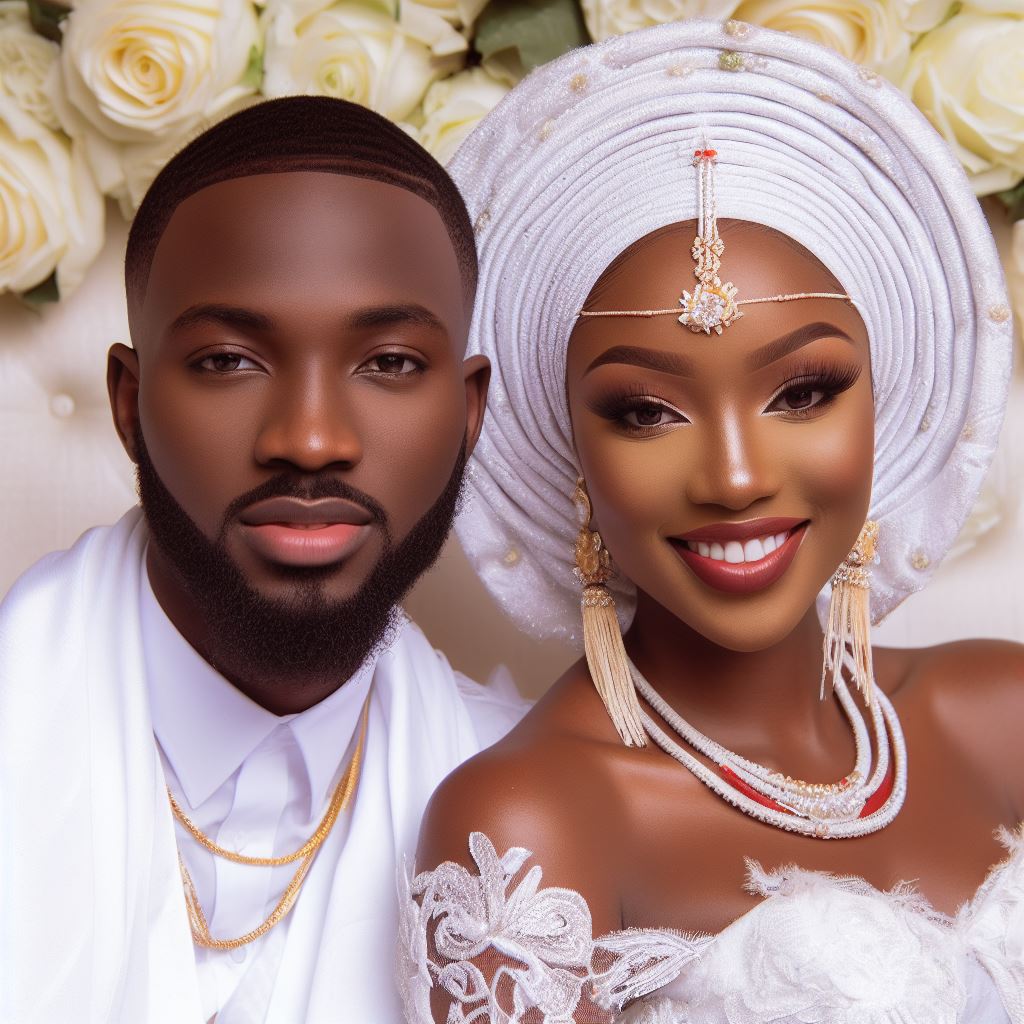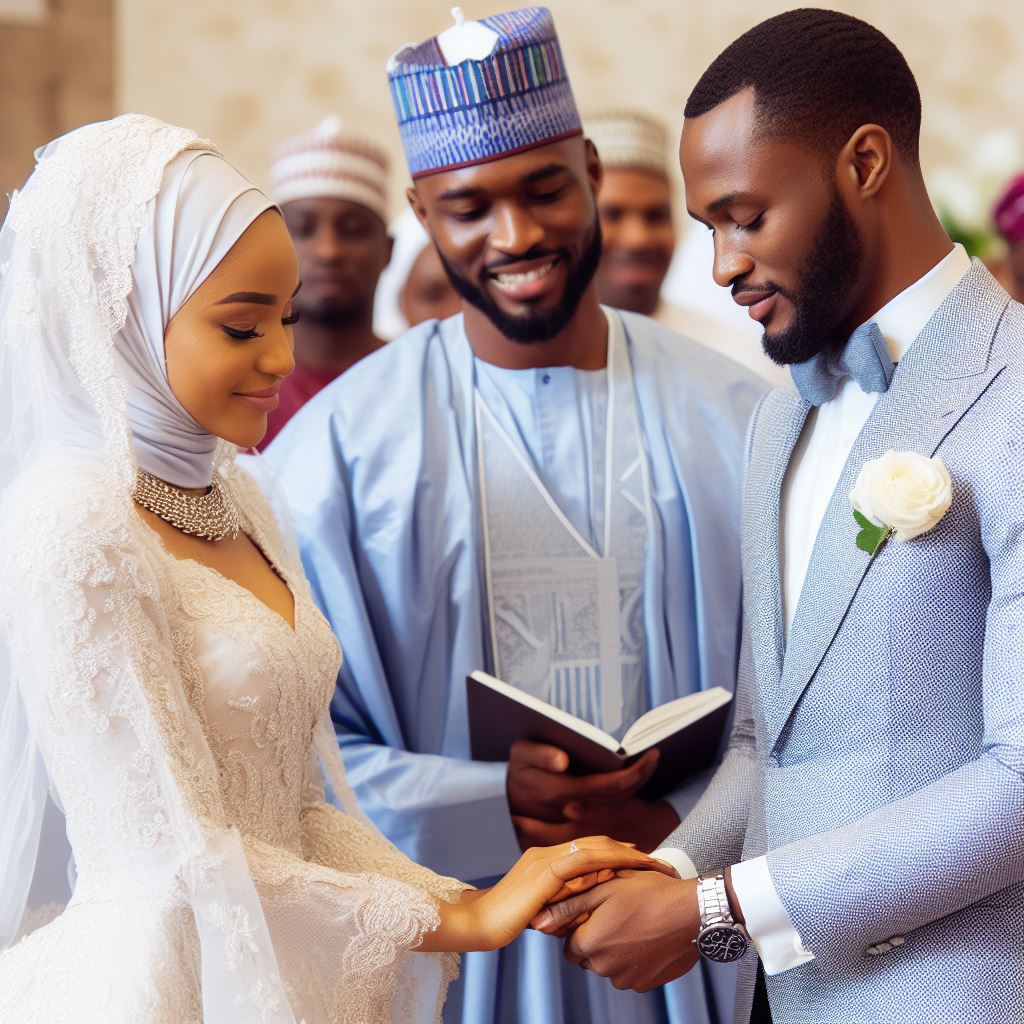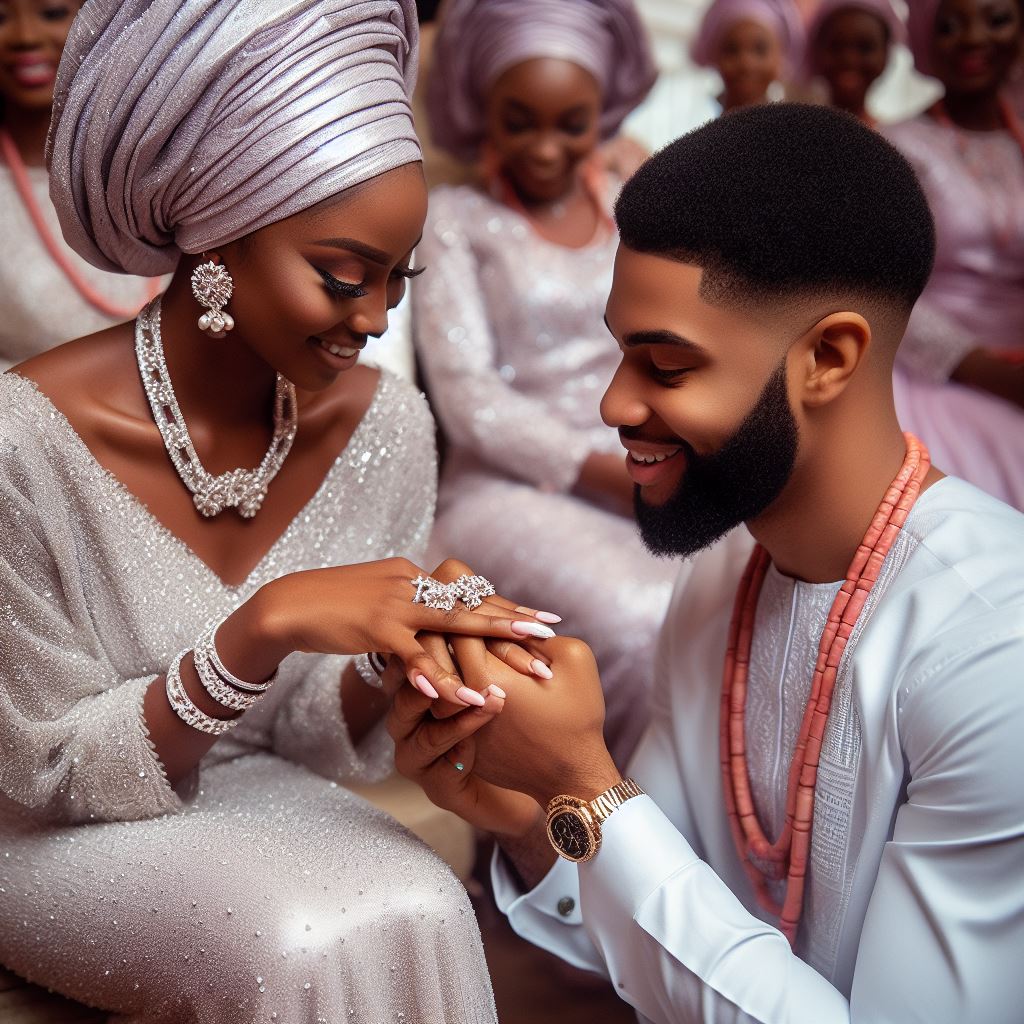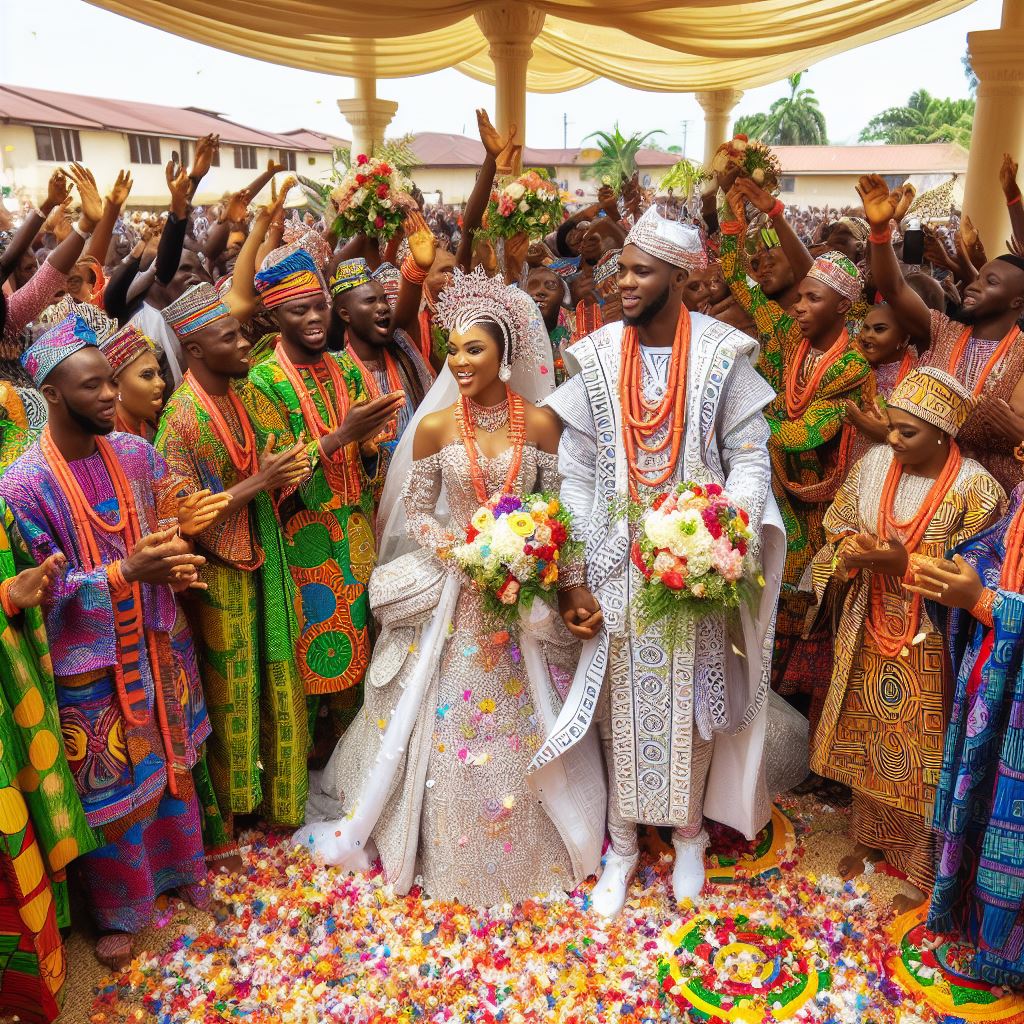Introduction
Yoruba Igbo Hausa Ethnic Love.
In Nigeria, inter-ethnic marriages transcend cultural boundaries, fostering unity and understanding.
This section delves into the profound connections shared by the Yoruba, Igbo, and Hausa ethnic groups.
These communities represent the nation’s rich tapestry, each with unique traditions and languages.
In this exploration, we aim to:
- Celebrate Diversity: Nigeria’s diverse ethnic makeup enriches its social fabric, enhancing communal bonds.
- Promote Unity: Inter-ethnic marriages exemplify unity in diversity, bridging cultural differences and promoting tolerance.
- Challenge Stereotypes: By spotlighting successful inter-ethnic unions, we challenge preconceived notions and biases.
- Inspire Understanding: Sharing stories of love beyond ethnic lines encourages understanding, acceptance, and appreciation for Nigeria’s diverse heritage.
- Highlight Love Stories: We’ll feature heartwarming narratives of Yoruba-Igbo, Igbo-Hausa, and Yoruba-Hausa unions, emphasizing the power of love in uniting communities.
Yoruba: Love and Marriage Traditions
Yoruba is one of the largest ethnic groups in Nigeria, with a rich cultural heritage and diverse traditions.
When it comes to love and marriage, the Yoruba people have unique customs that have been passed down through generations.
Marriage Customs and Traditions
In Yoruba culture, marriage is seen as a sacred institution and an important rite of passage.
The process typically starts with an introduction between the families of the bride and groom, often facilitated by a middleman.
Once the families agree to proceed, a formal engagement ceremony takes place, known as the ‘Introduction’ or ‘Knocking.’
During this ceremony, the groom’s family presents gifts to the bride’s family and the couple exchanges rings.
Following the engagement, the traditional wedding ceremony, known as “Igbeyawo,” is held.
This event involves various rituals, including the “Eru Iyawo” (unveiling of the bride) and the “Ijoko” (sitting on a mat).
The Yoruba people also attach great importance to the traditional wedding attire.
The bride usually wears a colorful, intricately embroidered outfit called an “Aso Oke,” while the groom dons a “Buba” and “Sokoto” with a matching cap.
The Importance of Love in Yoruba Culture
Yoruba culture holds love in significant regard, considering it the cornerstone of a successful marriage.
Yoruba people emphasize the need for compatibility, friendship, and deep emotional connection in relationships.
Also, Yoruba proverbs often compare love to a flowing river, symbolizing a strong bond that unites couples.
They view love as the driving force that motivates their enduring commitment and their willingness to overcome challenges together.
Successful Love Stories Across Ethnic Lines
The Yoruba people have a long history of inter-ethnic marriages, showcasing their openness to love beyond ethnic boundaries.
Many successful love stories have emerged between Yoruba individuals and people from other ethnic groups.
One famous example is the love story of Funmilayo Ransome-Kuti, a Yoruba woman, and Israel Oludotun Ransome-Kuti, a man from the Egba tribe.
Their union transcended ethnic differences and played a significant role in the fight for Nigerian independence.
Another notable inter-ethnic Yoruba marriage is that of Fela Kuti, a renowned musician, and his wife, Remilekun Taylor.
Despite facing societal backlash, their love defied all odds and created a lasting legacy in the Nigerian music industry.
Anecdotes of Famous Inter-Ethnic Yoruba Marriages
Yoruba culture also offers numerous anecdotal examples of famous inter-ethnic Yoruba marriages that have become legendary.
These stories inspire and reinforce the idea that love knows no boundaries.
One such story is the union between Oduduwa, the progenitor of the Yoruba people, and Olokun, a sea goddess from a different ethnic group.
Their marriage symbolizes the cultural fusion that defines Yoruba identity.
Additionally, the love story of Olaudah Equiano, a Yoruba man sold into slavery, and Susan Cullen, an Englishwoman who fought for his freedom, showcases the power of love to transcend oppressive systems.
In fact, Yoruba culture cherishes love as a vital component of marriage.
The Yoruba people have a long history of successful love stories that go beyond ethnic boundaries, proving that love truly knows no limits.
Read: Pros and Cons of Having a Marriage Contract in Nigeria
Igbo: Love and Marriage Traditions
The Igbo ethnic group, one of the largest in Nigeria, has rich marriage customs and traditions that reflect their vibrant culture and strong values.
Marriage in Igbo society is seen as a sacred union and is highly regarded.
Overview of Igbo Marriage Customs and Traditions
In Igbo culture, marriage is not just a union between two individuals but also between two families and their ancestral lineages.
It is a significant event that involves elaborate preparations and ceremonies.
Traditionally, the process begins with the suitor’s family approaching the bride’s family to express their interest in marrying their daughter.
The groom’s family must offer gifts, referred to as “igba nkwu,” to the bride’s family, showing respect and gratitude.
The Igbo believe in the concept of “igba nkwu,” which refers to the traditional wedding ceremony.
It is a colorful celebration where both families come together to bless the union.
This ceremony involves various rituals, such as the exchange of kola nuts, pouring of libations, and the breaking of the kolanut.
During the “igba nkwu” ceremony, the bride wears a beautiful outfit called the “iro and buba” or a modern traditional attire known as “george wrapper.”
The groom also dresses in traditional Igbo attire, usually a “isi agu” (lion head) outfit.
The Role of Love in Igbo Culture
In Igbo culture, love plays a crucial role in the decision to marry.
While arranged marriages were prevalent in the past, love marriages have become more common in recent times.
Young Igbo individuals now have the freedom to choose their partners based on mutual affection and compatibility.
Love is considered a binding force that strengthens the marital bond.
Believers consider it fosters unity between husband and wife, contributing to a harmonious and successful marriage.
The Igbo people value love and view it as the foundation of a lasting relationship.
Successful Love Stories between Igbo and Other Ethnic Groups
Inter-ethnic marriages have become increasingly prevalent in Nigeria, including love stories between the Igbo and individuals from other ethnic groups.
These unions demonstrate the acceptance, open-mindedness, and inclusivity of the Igbo people.
An example of a successful inter-ethnic Igbo marriage is the love story between Chidinma, an Igbo woman, and Ibrahim, a Hausa man.
Despite the initial challenges they faced due to cultural differences, their love for each other overcame all barriers.
Their marriage is now seen as a symbol of unity and tolerance.
Another notable inter-ethnic Igbo marriage is the union between Efe, an Igbo man, and Sarah, a Yoruba woman.
They defied societal expectations and stereotypes and chose love above all else.
Their marriage has become an inspiration for many couples facing similar challenges.
Anecdotes and Examples of Notable Inter-Ethnic Igbo Marriages
There are numerous anecdotes and examples of inter-ethnic Igbo marriages that showcase the beauty of love beyond ethnic lines.
One such example is the marriage between Emeka, an Igbo man, and Amina, a Fulani woman.
Their marriage is a testament to the power of love in bridging cultural divides.
Another remarkable inter-ethnic Igbo marriage is the union between Nkechi, an Igbo woman, and Chinedu, a Tiv man.
Despite their different cultural backgrounds, they have embraced each other’s traditions and created a harmonious blended family.
These anecdotes and examples highlight the resilience, love, and acceptance found within inter-ethnic Igbo marriages.
They serve as a reminder that love knows no boundaries and can unite people from different ethnic backgrounds.
In short, the Igbo people’s marriage customs and traditions reflect their strong cultural values.
Love is highly cherished in Igbo culture, and inter-ethnic marriages are celebrated as a symbol of unity and acceptance.
These love stories demonstrate that love transcends ethnic boundaries and has the power to bring people together in beautiful and meaningful ways.
Read: Cultural Influences on Nigerian Marriage Contracts
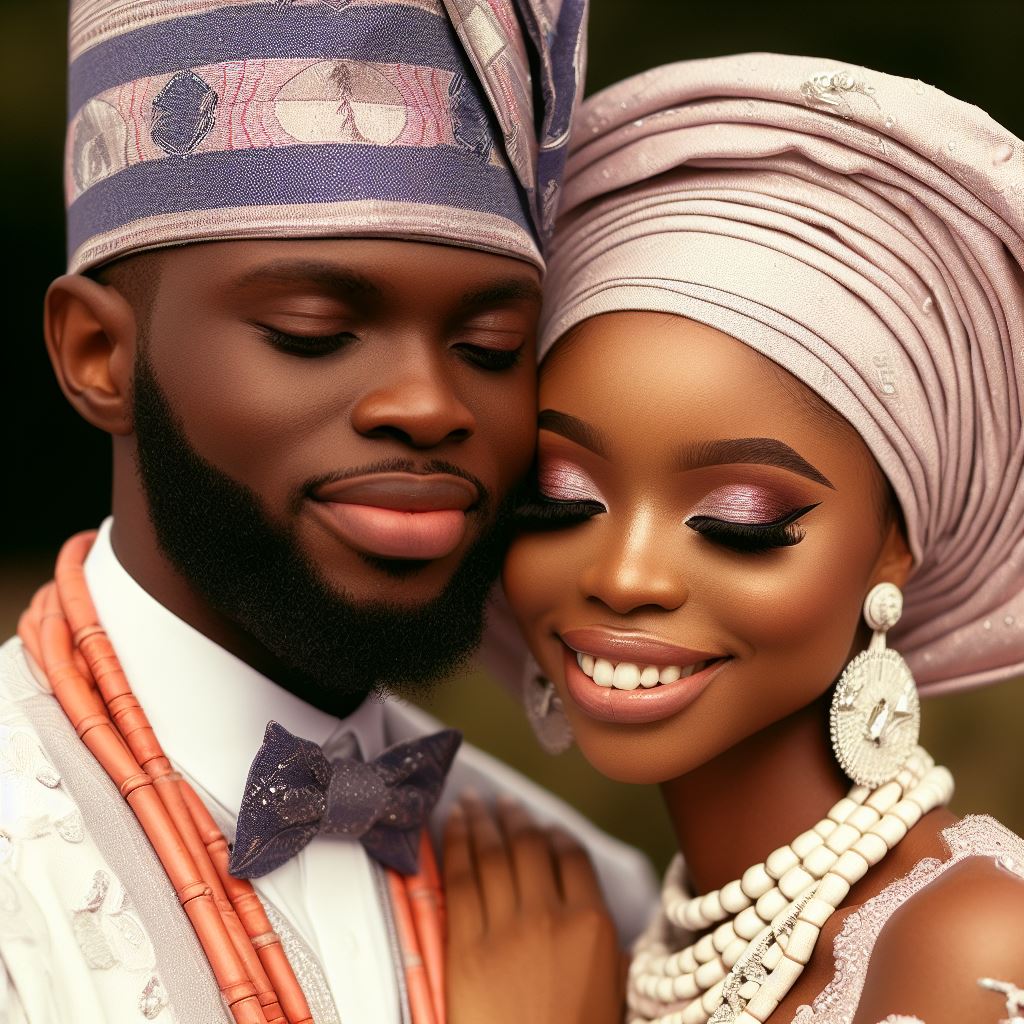
Hausa: Love and Marriage Traditions
The Hausa ethnic group, predominantly found in Northern Nigeria, has a rich cultural heritage with unique marriage customs and traditions.
In this section, we will explore the significance of love in Hausa culture, share successful love stories between Hausa individuals and those from other ethnic groups, and provide anecdotes of remarkable inter-ethnic Hausa marriages.
Overview of Hausa Marriage Customs and Traditions
- Hausa marriages are often arranged by parents, emphasizing the importance of family in their culture.
- Marriage negotiations involve the exchange of gifts, including money, livestock, and clothing.
- The consent of both the bride and groom is essential, although parental approval is highly valued.
- Islamic customs heavily influence Hausa marriage ceremonies, with the presence of a religious leader and recitation of Quranic verses.
- Polygamy is practiced in the Hausa culture, and men are allowed to marry up to four wives.
- The wedding ceremony, known as “Wedding Fatiha,” is a grand affair with traditional music, dance, and feasting.
- Hausa brides are adorned with exquisite jewelry and wear colorful, embroidered traditional attire.
Significance of Love in Hausa Culture
Contrary to the notion that Hausa marriages are purely arranged, love holds great importance in Hausa culture.
- While arranged marriages exist, the understanding and compatibility between the couple are considered crucial.
- Hausa proverbs, songs, and poetry beautifully portray the celebration of love and its power to unite individuals.
- Love is believed to flourish within the structure of arranged marriages through mutual respect and effort.
Successful Love Stories Between Hausa and Other Ethnic Groups
Inter-ethnic marriages between Hausa individuals and people from other ethnic groups have been successful and inspiring.
- The story of Ibrahim and Nkechi, who met at a university, defying ethnic stereotypes and cultural differences.
- Aisha, a Hausa woman, fell in love with Chinedu, an Igbo man, and they embraced their diverse backgrounds.
- Abdullah, from the Hausa community, found love with Ify, a Yoruba woman, and together they broke societal norms.
Anecdotes of Remarkable Inter-ethnic Hausa Marriages
Inter-ethnic Hausa marriages have bridged gaps and fostered unity in diverse communities.
- Zara, a Hausa bride, included Igbo and Yoruba traditions in her wedding ceremony, celebrating cultural diversity.
- Ali, a Hausa groom, learned the language and traditions of his Fulani bride, ensuring harmony and understanding.
- Halima, a Hausa wife, embraced her Hausa-Fulani husband’s heritage, enriching her own cultural experiences.
In general, the Hausa ethnic group’s marriage customs and traditions reflect a blend of arranged marriages and the significance of love.
Successful love stories between Hausa individuals and those from other ethnic groups highlight the power of love to transcend cultural boundaries.
Remarkable inter-ethnic Hausa marriages showcase a celebration of diversity and the creation of harmonious unity.
Read: Protecting Assets: The Financial Side of Marriage Contracts
You Might Also Like: Marriage Prayers: Seeking God’s Blessings for Nigerian Couples
Breaking Stereotypes: Challenges and Consequences
Inter-ethnic relationships provoke curiosity and controversy, facing family disapproval, societal judgment, and cultural clashes.
Challenges, if unaddressed, lead to consequences like strained relationships.
Family Disapproval
- Families, bound by cultural beliefs, often object to partners from different ethnic backgrounds.
- Deep-seated prejudices hinder couples from navigating familial objections, creating tension.
Societal Judgment
- Society’s biased views and discrimination, rooted in ethnic differences, affect relationships.
- Social exclusion, derogatory comments, and rejection challenge couples’ unity and confidence.
Cultural Clashes
- Differing cultural upbringings lead to clashes, from minor habits to major life decisions.
- Conflicts arise due to contrasting values and traditions, causing frustration and strain.
Despite these challenges, hope prevails through:
Mutual Understanding
- Open-mindedness and willingness to appreciate each other’s cultures foster harmony.
- Couples should learn, understand, and respect diverse backgrounds, finding compromises that honor both.
Inspiring Success Stories
- Tunde and Amaka, a Yoruba-Igbo couple, overcame stereotypes and family opposition.
- Abdullahi and Ngozi, a Hausa-Igbo pair, triumphed over societal judgment through shared respect and understanding.
Therefore, inter-ethnic relationships, though rife with challenges, can thrive with mutual respect and understanding.
Inspiring stories showcase the power of love in overcoming societal biases, urging others to embrace diversity for love’s sake.
Read: From Courtship to Forever: Nigerian Anniversary Wishes & Stories
Love Beyond Ethnic Lines: Celebrating Diversity
Love’s power to unite across ethnic boundaries is profound.
Nigeria’s diversity can be a source of unity through inter-ethnic marriages.
Inter-ethnic unions encourage cultural exchange, bridging divides with mutual respect.
Learning about each other’s traditions fosters a harmonious society.
In Nigeria, with over 250 ethnic groups, the celebration of diversity is vital. Inter-ethnic couples promote cultural understanding.
This fosters social cohesion, challenges stereotypes, and nurtures an inclusive society.
Love defies norms, emphasizing the human connection.
Inter-ethnic relationships create bridges between communities, reminding us that we share common aspirations for love and connection.
Encouraging acceptance beyond ethnicity is crucial. Education, cultural programs, and platforms can celebrate these relationships.
Sharing success stories of inter-ethnic couples inspires others to focus on the qualities that matter.
Love beyond ethnic lines breaks down barriers, fostering understanding, appreciation, and respect for different cultures.
Celebrating diversity through inter-ethnic relationships contributes to a more inclusive, united Nigeria. Love transcends boundaries.
Conclusion
In this blog post, we explored the theme of love transcending ethnic boundaries, focusing on the Yoruba, Igbo, and Hausa tribes.
We highlighted stories of inter-ethnic relationships and marriages that defy societal norms.
These relationships prove that love knows no borders or ethnicities.
Love has the power to unite people from different backgrounds, breaking down barriers and fostering understanding.
It teaches us to embrace diversity and appreciate the richness of various cultures.
By celebrating love that goes beyond ethnic lines, we can promote tolerance and acceptance in our communities.
Let us remember that love is a universal language that can bridge gaps and create connections.
It has the potential to create a harmonious society where everyone is treated with respect and empathy.
If we open our hearts and minds, we can build a world where love conquers ignorance and prejudice.
So, let us celebrate the power of love.
Let us encourage inter-ethnic relationships and marriages, for they bring hope, happiness, and unity.
Together, we can create a society where love thrives and people come together, regardless of their ethnicity.
Love truly has no boundaries, and it is through love that we can build a brighter future for all.

